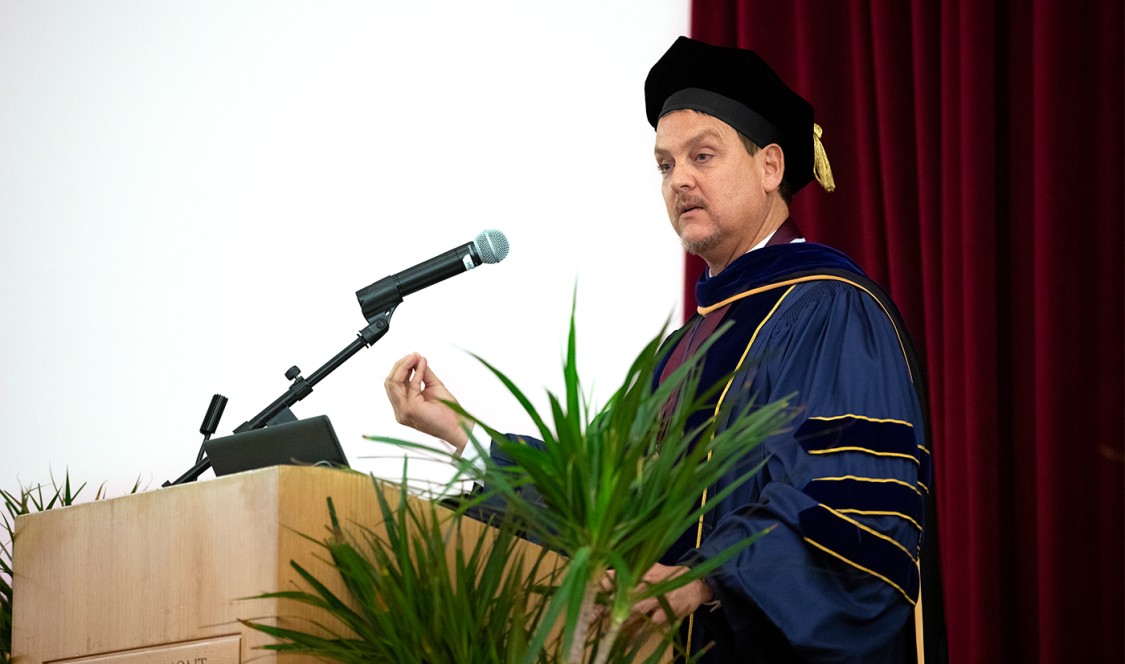Students began the academic year with a charge to prepare themselves for “a world that beckons for responsible leadership” at the College’s annual convocation.
Addressing the audience of faculty, staff, and students, including the newly arrived class of 2023, in McKenna Auditorium, President Hiram E. Chodosh said that solving serious and mounting world problems requires leaders to bring conflicting viewpoints together for a common solution. “Leadership that is open to free expression when it is most disagreeable, that engages in debate with respect, that commits to open inquiry to get at a deeper, shared understanding and masters dialogue to resolve conflict in creative ways,” said Chodosh, a declaration echoed in the remarks of keynote speaker Gastón Espinosa, Arthur V. Stoughton Professor of Religious Studies, and Dina Rosin ’20, president of the Associated Students of Claremont McKenna College.
Noting that the original idea of the College was to offer “a rationally balanced education to meet the political, economic, social, and cultural needs of students to prepare them for leadership in world affairs,” Chodosh offered a three-pronged vision for CMC’s future that was firmly rooted in that past.
In the year ahead, CMC’s foremost priority will be continuing its founding ideals through a powerful liberal arts curriculum and commitment to open, multi-disciplinary inquiry. Chodosh said CMC’s founders would be pleased to see their vision expressed through the College’s robust student research opportunities, an ambitious athletic program, and signature programs including the award-winning Model UN, Care Center, Open Academy, and the Athenaeum speakers series.
Although the natural and physical sciences, mathematics, and related fields have always been part of CMC’s liberal arts education, Chodosh said the College, like the rest of the country, has not kept pace with the exponential growth in the sciences and technology and their impact on the economy and public policy. CMC’s second priority is to not only catch up, but to “seize the opportunity to jump ahead to build a highly collaborative program that has not been developed before, one that will strengthen all of our departments, one that will shape the further development of our campus,” said Chodosh, describing CMC’s commitment to “strengthen and integrate the sciences and computation, as both are now essential to the liberal arts and leadership.”
Reflecting again on the College’s origins, Chodosh said in 1946, CMC’s founders—nearly all veterans—believed in giving students the financial support as well as the intellectual and social tools they needed to pursue their dreams. The continued support of student opportunity—the College’s third priority—will “build on that legacy and on our recent achievements to help our students remove the barriers in their way to strive and thrive, to become someone, something, somebody.”
Making that kind of impact is only possible for those who put the ideas of a liberal arts education into action, said Espinosa, who followed Chodosh’s remarks with a talk entitled “Notes on Cultivating the Intellectual Life.” Espinosa said a “growing tribalism and intolerance of others is creating a hunger for leaders who, because they cultivate an intellectual life, can suggest real community-oriented solutions to the problems that vex us.” Paying attention to the life of the mind “enables us to go beyond superficial understandings, stereotypes, and biases,” and then “draw on our store of ideas, sources, and disciplines to engage critically in adaptive problem solving.”
In the final speech of the event, Rosin called for the same intellectual robustness, and urged CMC’s newest students to become “radically curious,” and to approach learning with a willingness to question assumptions, even when it is difficult to do so. “What parts of daily life have become so normalized that we may be epistemically limited from recognizing their injustice?” asked Rosin. “How can we use our education to illuminate these injustices now?”
— Susan Price
As is custom at convocation, several faculty and staff were honored by the College for distinguished service. Professors Peter Uvin, Vice President of Academic Affairs and Dean of the Faculty, Shana Levin, Crown Professor of Psychology and Associate Dean of the Faculty, and Emily Wiley, Associate Dean of the Faculty and Professor of Biology, cited the following honorees:
25 Years of Service
- Ken Scalmanini, Assistant Professor of Physical Education & Head Men’s Basketball Coach
30 Years of Service
- Mark Costanzo, Professor of Psychology
- Dorothy Smith-Davis, Administrative Assistant in Advancement
- Richard Burdekin, Jonathan B. Lovelace Professor of Economics
- Mitch Brown, Assistant Director of Media Technology Services
35 Years of Service
- John Goldhammer, Professor of Physical Education, Associate Director of Athletics, Men's and Women's Track Head Coach
- Marjorie Charlop, Professor of Psychology and Director of the Autism Center
40 Years of Service
- Jodie Burton, Professor of Physical Education, Associate Director of Athletics, and Women’s Golf Head Coach
- Michael Sutton ’76, Director of Advancement for Athletics
- Sylvia Gonzales, Building Attendant
45 Years of Service
- Anthony Fucaloro, George C. S. Benson Professor of Public Affairs and Professor of Chemistry.
Staff Recognition
- Vince Greer, Associate Dean of Students for Diversity, Inclusion, and Residential Life and Director of the CARE Center
- Beth Jager, Associate Director of Institutional Philanthropy
- Charlene Kile, Employer Relations Coordinator
- Aithan Peterson, Assistant Director of Academic Administration

